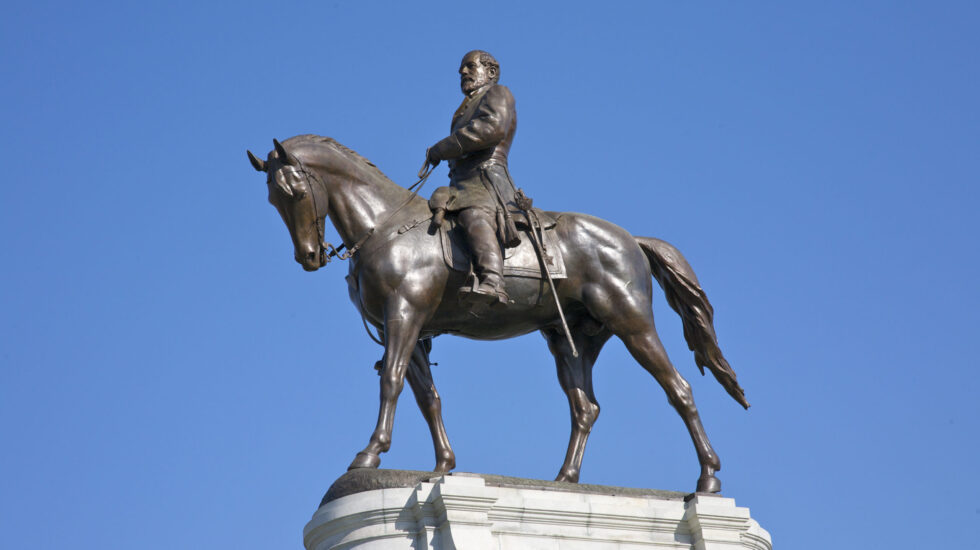A sixty foot statue of Robert E. Lee, the defeated Confederate general, was removed from its perch in Richmond, Virginia on Wednesday. Onlookers cheered the obvious symbolism. Yes, a 130 year-old monument was being toppled, but so was the persistent myth that Lee was some sort of hero.
But Donald Trump wasn’t cheering. The ex-president was stewing at his Bedminster, New Jersey golf course. He released a statement criticizing the statue’s “desecration,” saying it was part of a “Radical Left” agenda.
Trump went on to praise Lee with his signature bombast, saying “many Generals” consider him “the greatest strategist of them all.” He added that Lee was “the greatest unifying force after the war was over.”
And despite Lee’s record in the Civil War – 258,000 of his men perished in the Confederacy’s failed effort and the South’s economy was crippled – Trump speculated that Lee would have won the war in Afghanistan.
The idea of Lee’s grandeur is part of the so-called Lost Cause, which is an attempt to reframe the Confederacy as a noble defense of the Old South. In this fact-challenged interpretation of history, the South’s refusal to end slavery was not the animating force behind the Civil War.
The Washington Post debunked this notion:
[Alexander] Stephens, the vice president of the Confederacy, said that not only did slavery form the “cornerstone” of the foundation on which the new Confederate government was laid, but also that it was the “immediate cause of the late rupture and present revolution.” Mississippi’s declaration of secession, like those of other states, did not mince words: “Our position is thoroughly identified with the institution of slavery.”
One of the tenets of the Lost Cause is that Lee abhorred slavery. This, too, is untrue. From The Atlantic:
In Reading the Man, the historian Elizabeth Brown Pryor’s portrait of Lee through his writings, Pryor writes that “Lee ruptured the Washington and Custis tradition of respecting slave families” by hiring them off to other plantations, and that “by 1860 he had broken up every family but one on the estate, some of whom had been together since Mount Vernon days.” The separation of slave families was one of the most unfathomably devastating aspects of slavery, and Pryor wrote that Lee’s slaves regarded him as “the worst man I ever see.”
Following the war, Lee tried to whitewash his views on slavery. From Politifact:
[John Reeves, author of “The Lost Indictment of Robert E. Lee”] explains that after losing the war, Lee attempted to present himself as always being against slavery. In an interview after his surrender, Reeves says, Lee said that “the best men of the South” were eager to do away with it, and in a testimony in 1866 he had “always been in favor of emancipation — gradual emancipation.”
But Reeves writes that the historical record doesn’t support these statements, as Lee and his family owned and managed slaves for decades and benefited “tremendously” from the institution.
Indeed, in The New York Times Book Review, historian Eric Foner explains how Lee’s writing are often misconstrued to make him appear more moderate on slavery. Foner also exposes the lie of Trump’s claim that Lee was a ‘unifiying force” after the war:
During his lifetime, Lee owned a small number of slaves. He considered himself a paternalistic master but could also impose severe punishments, especially on those who attempted to run away. Lee said almost nothing in public about the institution. His most extended comment, quoted by all biographers, came in a letter to his wife in 1856. Here he described slavery as an evil, but one that had more deleterious effects on whites than blacks. He felt that the “painful discipline” to which they were subjected benefitted blacks by elevating them from barbarism to civilization and introducing them to Christianity. The end of slavery would come in God’s good time, but this might take quite a while, since to God a thousand years was just a moment. Meanwhile, the greatest danger to the “liberty” of white southerners was the “evil course” pursued by the abolitionists, who stirred up sectional hatred. In 1860, Lee voted for John C. Breckenridge, the extreme proslavery candidate (a more moderate southerner, John Bell, carried Virginia that year).
Lee’s code of gentlemanly conduct did not seem to apply to blacks. During the Gettysburg campaign, he did nothing to stop soldiers in his army from kidnapping free black farmers for sale into slavery. In Reconstruction, Lee made it clear that he opposed political rights for the former slaves. Referring to blacks (thirty per cent of Virginia’s population), he told a Congressional committee that he hoped the state could be “rid of them.” Urged to condemn the Ku Klux Klan’s terrorist violence, Lee remained silent.
In an opinion piece for NBC News, historian Ty Seidule adds that Lee’s resignation from the Union Army and defection to the Confederacy was hardly motivated by geography. Seidule, an Army veteran, writes:
There were eight colonels in the U.S. Army from Virginia at the time the state seceded. All West Pointers, seven remained loyal. Lee and only Lee chose treason, chose to try to destroy the United States. And in doing so, he chose to fight for a new country dedicated to human enslavement.



